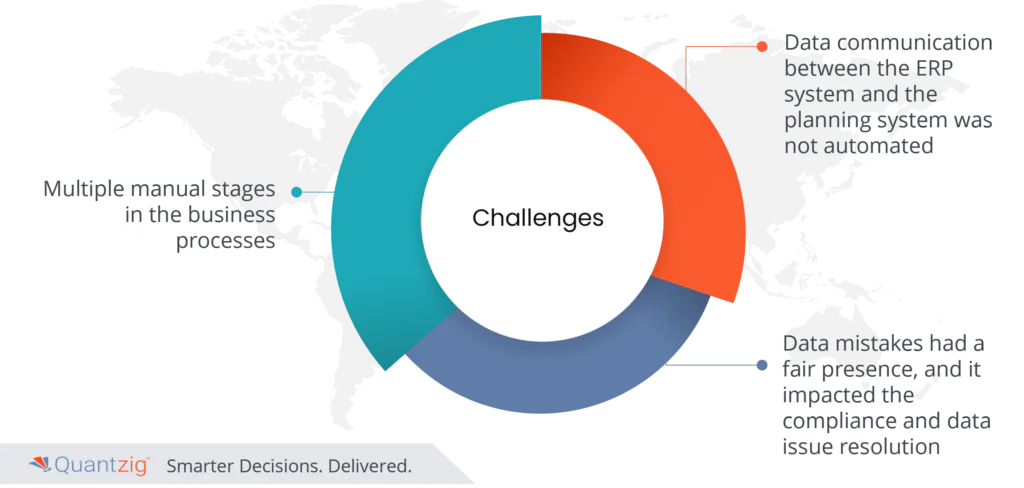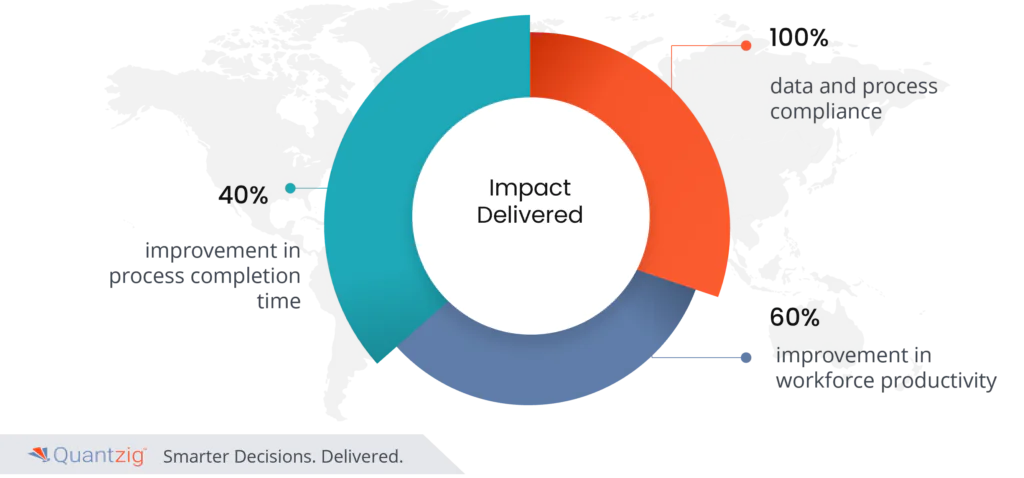Written by: Sudeshna Ghosh
Table of Contents
Harnessing the Transformative Power of Business Process Automation RPA for Enhanced Efficiency
In today’s fast-paced and competitive business environment, Business Process Automation (BPA) is increasingly recognized as a critical tool for achieving operational excellence and transparency. It involves the strategic use of software to automate a wide range of repetitive tasks integral to a company’s core processes. BPA not only streamlines business operations for simplicity and efficiency but also plays a key role in achieving digital transformation, enhancing service quality, and managing costs effectively. Its application spans across various business aspects, from marketing and sales to HR, training, compliance, and more.
While business process automation primarily focuses on optimizing business operations through technology and transparency, it’s crucial to recognize that the broader spectrum of business process management may also involve non-automated operations tactics to enhance and streamline procedures. This comprehensive article delves into the myriad benefits that automated processes and automated business processes offer to enterprises of all sizes, highlighting how BPA can be a game-changer in today’s dynamic business landscape.

The Crucial Role of Business Process Automation in Modern Enterprises
Business Process Automation (BPA) is a vital cog in the machinery of contemporary organizations. It works hand-in-hand with ERP systems and planning software, effectively overcoming the hurdles posed by manual inefficiencies. By automating processes tasks like data cleansing, error corrections, and approval workflows, BPA significantly accelerates various business processes. This intelligent automation leads to increased productivity and agility, resulting in quicker turnaround times, faster deal closures, and higher customers satisfaction levels.
Moreover, a strategic approach to business process automation minimizes human intervention errors, ensuring data accuracy and compliance with standardized procedures. This automation allows employees to redirect their focus from mundane tasks to strategic initiatives, fostering an environment ripe for innovation and growth. By embracing BPA, businesses are well-equipped to optimize resource utilization, enhance operational efficiency, and secure a competitive edge in the rapidly evolving marketplace, all of which are essential for sustainable success.
In addition to optimizing efficiency and reducing wastage, business process automation plays a critical role in helping businesses stay competitive. Automating labor-intensive tasks not only cuts costs but also accelerates workflows and minimizes errors, freeing up valuable resources to focus on strategic initiatives. This streamlined approach bolsters productivity, customer service, and overall performance. With the agility and precision afforded by business process automation technologies, organizations can swiftly adapt to market demands, driving innovation and scalability. This competitive advantage is key to thriving in today’s challenging business landscape, ensuring long-term viability and delivering high-quality solutions to clients.
Challenges in the Absence of Business Process Automation Solutions
The lack of business process automation (BPA) solutions in an organization can lead to several significant challenges that hinder its efficiency and competitive edge. One of the primary issues is the prevalence of manual processes, which are inherently prone to errors and inefficiencies. These inaccuracies in data can severely hamper decision-making capabilities, impeding the organization’s ability to respond swiftly to market changes and opportunities.
Manual processes often involve repetitive and time-consuming tasks, consuming valuable employee engagement and effort that could otherwise be directed towards more strategic and innovative endeavors. This not only limits the potential for innovation and productivity but can also lead to employee dissatisfaction and decreased morale, negatively impacting the overall growth of the business.
Furthermore, the absence of automation in key processes like data transfer and reporting slows down the availability of critical information. This delay in data accessibility can result in missed opportunities, reduced customer satisfaction, and a slower pace of analysis and decision-making. It also restricts the organization’s scalability and adaptability, making it challenging to cope with increasing demands and complexities of the modern business environment.
In summary, forgoing business process automation can place significant constraints on an organization’s operational excellence, growth potential, and ability to empower its employees to drive the business towards lasting success in a competitive landscape.
The Transformative Benefits of Business Process Automation for Enterprises
Business Process Automation (BPA) offers a multitude of transformative benefits that revolutionize enterprise operations. By automating repetitive tasks and streamlining workflows, BPA significantly enhances operational efficiency. This leads to a error reduction and reduced operational costs, while simultaneously increasing productivity. Employees are freed from mundane tasks, enabling them to focus on high-value activities that foster innovation and business growth.
Additionally, BPA plays a crucial role in ensuring consistency and compliance in business operations. By enforcing standardized procedures, it leads to improved quality in outputs and heightened customer satisfaction. The real-time data insights provided by automation tools enable more informed and agile decision-making, crucial in today’s rapidly changing market landscape.
Moreover, BPA is instrumental in boosting employee engagement and enhancing ROI. Automating tedious and time-consuming manual tasks allows employees to concentrate on strategic and meaningful projects. This not only elevates job satisfaction and motivation but also reduces stress and burnout caused by manual errors and delays. With more time and energy available for creative and innovative work, employees can drive continuous improvement and add significant value to the business.
In the competitive world of modern business, BPA serves as a catalyst for fostering a dynamic, engaged workforce. It propels organizations towards sustainable growth and success, making BPA an indispensable tool for any enterprise looking to optimize performance, maintain competitiveness, and deliver exceptional results.

In summary, the methodology of business process automation presents significant benefits for modern organizations’ profitability and sustainability. By automating labor-intensive and repetitive tasks, enterprises enhance customer experience and achieve cost savings. Automation software, a key component of digital automation, plays a crucial role in this transformation, leading to greater efficiency and optimization.
Business process automation, including of RPA (of Robotic Process Automation), empowers businesses to swiftly adapt to changing market demands, thus fostering agility and scalability. The advantages of implementing automation, particularly through automated systems and digital processes, contribute significantly to business benefits. The experience of deploying business automation solutions provides a critical edge in competitive markets.
Ultimately, business process automation is not just a technological upgrade; it’s a strategic transformation aimed at improving ROI. It enables enterprises to leverage analytics and optimize performance, staying ahead in the dynamic business landscape. This approach ensures enduring success and resilience in an ever-changing market.
Success Story:
Quantum Leap in Efficiency and Accuracy through Business Process Automation
Client Details: Quantzig recently collaborated with a leading U.S.-based manufacturing company specializing in industrial equipment. With an extensive network of suppliers and distributors, they were poised for growth but hampered by operational inefficiencies.
Challenges:

- Multiple Manual Stages in Business Processes: The client grappled with cumbersome manual stages in their business processes and its integration, particularly in managing vendor data received through emails. This led to significant time consumption in data tracking, cleaning, and Excel operations, with approvals adding further delays. The lack of automation not only heightened the risk management of errors but also resulted in a drastic 80% drop in productivity.
- Unautomated Data Communication Between ERP and Planning Systems: The client faced considerable challenges due to manual data communication between their ERP and planning systems. Manual version control, data quality checks, and coordination consumed a substantial portion of resources, leading to data discrepancies and increased error rates.
- Data Mistakes Impacting Compliance and Resolution: Manual data handling processes were leading to frequent errors and inaccuracies along with integration issues, complicating compliance with industry standards and regulations. Additionally, resolving data issues was time-consuming and complex due to the absence of automated validation and error reduction.
Solutions:
- Conducted structured end-user discussions to identify process inefficiencies and opportunities for collaboration automation.
- Developed custom-built automation applications, including demand planning automation, NLP, OCR-based invoice data flow, and set up alert and workflow automation for easier collaboration.
- Automated data gathering from Excel and Emails, coupled with automated quality control and data transformation processes, significantly enhancing data handling efficiency and accuracy.
- Standardized UI creation facilitated seamless collaboration and data sharing across global teams, promoting consistency and better communication.
Impact Delivered:

- Achieved a 40% improvement in process completion time, marking a significant leap in operational efficiency.
- Ensured 100% data and process compliance, aligning perfectly with industry standards and regulations.
- Realized a 60% improvement in workforce productivity, allowing the client to focus on strategic initiatives and growth.
This partnership with Quantzig epitomized the transformative power of business process automation, turning around a leading manufacturing company’s efficiency and accuracy. The client not only overcame their operational challenges but also positioned themselves for future scalability and success in the competitive industrial equipment market.
FAQs on Business Process Automation
- What are the key benefits of business process automation? Business process automation offers numerous benefits including improved efficiency, increased products, way higher cost and time savings, enhanced accuracy and data management, streamlined workflows, better decision-making, and heightened customer satisfaction.
- How does business process automation improve efficiency? Automation improves efficiency by streamlining repetitive tasks, reducing the need for manual intervention, and minimizing human errors. This leads to quicker, more accurate processes and allows employees to focus on more strategic work.
- Can business process automation reduce costs? Yes, business process automation can significantly reduce costs by minimizing manual labor, reducing errors (which can be costly to fix), and optimizing resource allocation. Companies that implement automation often see a notable decrease in operational expenses.
- What impact does automation have on productivity? Automation has a positive impact on productivity by streamlining processes, speeding up task completion, and freeing employees from repetitive tasks so they can focus on more value-added activities.
- Are there any drawbacks or risks associated with business process automation? While automation brings many benefits, there are potential drawbacks such as the initial cost of implementation, the need for ongoing maintenance and updates, and the risk management of over-reliance on technology which could lead to vulnerabilities if systems fail.
- How does automation streamline workflow in a business? Automation streamlines workflows by integrating different processes, reducing manual touchpoints, and ensuring that tasks are completed consistently and efficiently. This leads to smoother operations and better coordination across different business areas.


